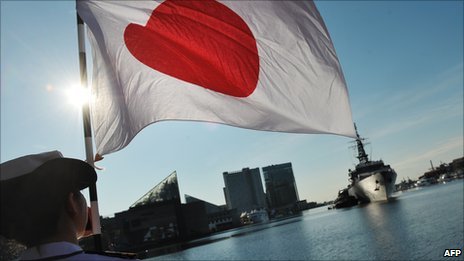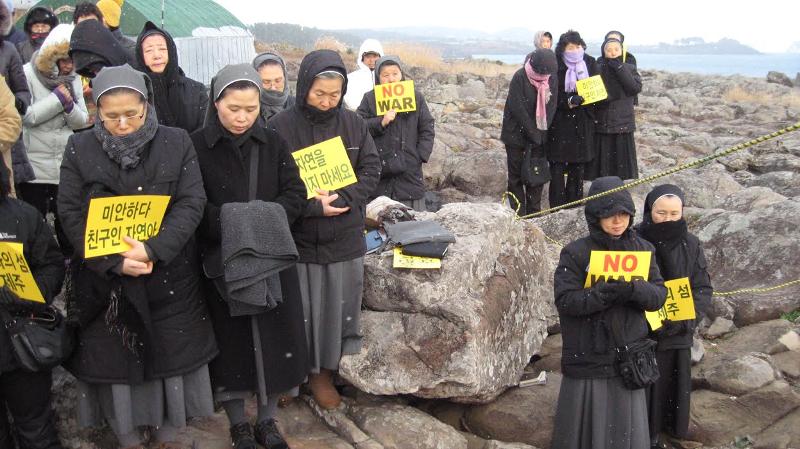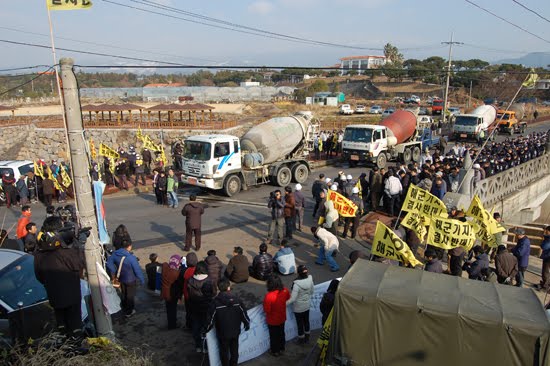| Organizers
|


|
|
|
Dear Friends and Supporters of Article 9,
Happy New Year!
We are pleased to send you some information about the Global Article 9 Campaign to Abolish War's recent activities and related developments.
|
JAPAN'S NEW DEFENSE POLICY - REVISITING THE COUNTRY'S PACIFIC IMAGE?
On December 17, the Japanese Cabinet published new defense guidelines - the first policy review since 2004.
 Issued under the leadership of Democratic Party of Japan (DPJ), in power since 2009, the 2010 National Defense Program Guidelines (NDPG) are to shape the country's defense policy over the coming years. Issued under the leadership of Democratic Party of Japan (DPJ), in power since 2009, the 2010 National Defense Program Guidelines (NDPG) are to shape the country's defense policy over the coming years.
The policy revision takes place in a context of what the guidelines call a "global shift in the balance of power" with "the rise of emerging powers and relative change in the US influence." Indeed, Japan increasingly sees China's ongoing military modernization and North Korea's nuclear and missile development as threats to its national security. Furthermore, the new guidelines also aim to address new threats posed by cyber warfare, terrorism and piracy.
The new NDPG claim to be in conformity with Japan's defense policy tradition and Tokyo gave insurances that the country will "continue to uphold ... [its] exclusively defensive defense policy and the three non-nuclear principles." Yet critics have expressed their fear that the new guidelines may revisit some important principles enshrined in Japan's peace Constitution.
Among the most notable changes set forth by the NDPG figure the integration of the decision-making process under the leadership of the Prime Minister as part of an integrated security strategy, as well as the development of a "dynamic defense capability" (as opposed to Japan's traditional basic deterrence-based security policy). Though China is not explicitly mentioned in this context, analysts explain the shift as clearly referring to China - the language used in the guidelines being "southbound". A more proactive and flexible military approach will require a shift of resources from conventional heavy forces to more flexible and mobile capability (notably with an upgrade of Japan's fighter jets and expansion of its submarine fleet).
At the center of the review lies the desire to "deepen" the alliance with the US, deemed as "indispensable" to Japan's security. Washington has long been calling for Japan to play a stronger security role in the region. The NDPG also recommend the strengthening of security cooperation through "multi-layered" bilateral and multilateral frameworks in Asia-Pacific, notably with South Korea and Australia.
Further, the document calls for "a more efficient and effective manner" of participating in international peace cooperation activities. This implies a review of Japan's five principles on Peacekeeping operations - notably further discussions on the criteria for the dispatch of Self-Defense Forces abroad and the use of weapons, whose conformity with Article 9 of Japan's Constitution has been much debated.
The new defense policy, however, has refrained from explicitly calling for a review of the country's longstanding ban of arms exports.
Established in 1967 in the spirit of Article 9 of the Constitution, Japan's Three Principles on Arms Exports do not permit exports of weapons to Communist block countries, countries subject to United Nations sanctions, or countries involved in international conflicts. The export ban was virtually extended to all countries in 1976.
Though the government had initially been considering a review of the so-called three principles with the intention of loosening them, it eventually decided against including the debate in the NDPG to avoid alienating the Social Democratic Party, whose support was crucial. The issue of arms exports remains however at the center of the debate, as the government foresees that Japan will ''consider measures to deal with major changes" in that regard in the Diet and at the national level. But Seijo University associate professor Aoi Miho warns: ''the three principles are measures that embody Article 9, and as such should not be changed readily.''
The newly adopted defense policy guidelines are a source of concern among many lawmakers and political analysts in Japan and in the region.
Indeed, China perceives the new defense guidelines as "provocative" and "irresponsible," and criticized the NDPG stating they "will only create more suspicion and mistrust in the region." Likewise, Japanese analysts fear they could jeopardize regional peace and stability by creating suspicion and distrust among the country's neighbors, who may interpret the review as an indication of Tokyo's willingness to raise Japan's military profile.
In Japan, critics have raised their voice against what they consider to be a move in the wrong direction.
The Democratic Party of Japan was elected in 2009 after a campaign that put forward the DPJ's pacifist orientation, notably in regards to the US presence in Okinawa. The new NDPG, to many, seem to be questioning some of the core values enshrined in Article 9 of Japan's Constitution.
Foreign Minister Maehara Seiji, answering questions on the new policy, said: "The foundation of our country is our Constitution, and the three pillars are fundamental human rights, democracy, and pacifism... At the same time, however, I think that we must react properly to the changing times."
The debate over reviewing Japan's arms export policy and participation in UN peacekeeping operations abroad, as well as the country's new positioning in the region threaten to tarnish Japan's postwar pacifist image.
In the words of military journalist Maeda Tetsuo: ''Japan has had a brand image as a nation that neither sells weapons nor sends combat troops abroad, and for this, it has been valued by the world."
Article 9 of the Constitution renounces war as a means of settling international disputes and prohibits the maintenance of armed forces and other war potential. It has also acted as an international peace mechanism that calls for a global peace that does not rely on force.
Read a summary of the 2011 NDPG here.
Picture credit: Agence France Presse
|
JEJU ISLAND CONTINUES TO PROTEST AGAINST THE CONSTRUCTION OF A NAVAL BASE
Protests continue on Jeju Island, South Korea - also known in the region as the peace island - where the US and South Korean governments plan to build a navy base.
Though neither Seoul nor Washington have explicitly stated so, the base is expected to host US and South Korean Aegis destroyers equipped with missile defense systems, as part of the US strategy to contain China and in a regional context of increased focus on maritime security. With Jeju Island located very strategically at the center of Northeast Asia, the presence of a base there will certainly precipitate the escalation of the arms race in the region.
This winter as construction begins, neither snow, wind or a below-zero temperature have discouraged villagers of Gangjeong from protesting against the construction of the naval base, which threatens to bring more conflict in the region, as well as destroy soft coral habitats listed by the UNESCO as world heritage environmental sites, and disrupt fishing and the way of life of the people of Jeju Island.
 On Christmas Day, a Catholic mass for peace was held on the island, during which some 400 to 500 followers and Gangjeong villagers gathered to call for "the Jeju island of Peace [to be saved] from the naval base construction." On Christmas Day, a Catholic mass for peace was held on the island, during which some 400 to 500 followers and Gangjeong villagers gathered to call for "the Jeju island of Peace [to be saved] from the naval base construction."
Seeing the construction of a base so close to China's coastline as a US provocation that will bring more conflict to their part of the world, the villagers held yellow signs reading "No War".
A few days later, 34 residents and supporters of Gangjeong village were arrested for trying to stop materials, notably cement trucks, from being brought onto the base's construction site.
A popular tourist destination, Jeju Island has been chosen as one of 28 candidates for "The New 7 Wonders of the World", a campaign initiated in 2000 aimed at encouraging citizens around the world to select seven new wonders of the world by popular vote. 
The coasts of Jeju Island were granted special preservation status under a law on the development of the Jeju Island enacted in 1991 and confirmed in 2004. The Island's government and navy, however, single-handedly cancelled the Island's special status in 2009 as part of their plans to build the naval base.
Gangjeong villagers have filed an administrative lawsuit in Jeju's local court to appeal the decision on the grounds that "the nature environment of the coastal areas of the Gangjeong village should be protected by the special law and regulations of the Island."
On January 7, the Gangjeong Village People's Council sent a request to Joint Chief of Navy Kim Sung-Chan to stop the construction of the base until the court issues its decision on the appeal.
 Civil actions and protests continue to take place, including a relay one-man protest since January 10 in front of the Island Hall, as well as statements of solidarity with the people of Jeju Island from Japan, the US and beyond. Civil actions and protests continue to take place, including a relay one-man protest since January 10 in front of the Island Hall, as well as statements of solidarity with the people of Jeju Island from Japan, the US and beyond.
For more information and updates, visit the No Base Stories of Korea blog here and Global Network Against Weapons & Nuclear Power in Space's Organizing Notes here.
Photo credit: First and last picture: No Base Stories of Korea; middle picture: News Jeju
|
BRIDGES NOT BASES: RESIST THE SPREAD OF US MILITARIZATION AND PROMOTE A CULTURE OF PEACE
Bridges Not Bases is a new grassroots initiative of SOA Watch - an independent organization that seeks to close the US Army School of the Americas (SOA) and change the US foreign policy in Latin America that SOA represents.
Since 2006, SOA Watch Founder Fr. Roy Bourgeois and Latin America Coordinator Lisa Sullivan have toured Latin America to reach out to victims of the SOA, relatives of people who have been "disappeared" because of the policies it represents, and groups working to bring justice and end impunity in the region.
After visiting 17 Latin American countries that send troops to the SOA and meeting with 8 presidents and 13 Defense Ministers, four countries, namely Venezuela, Argentina, Uruguay and Bolivia have decided to withdraw from the SOA, and a large number of organizations have joined the SOA Watch movement, pressuring their governments to do the same and opposing militarization in the region, as expressed by growing US military bases, training and militarization of humanitarian fleets.
In June 2010, activists from 19 countries of the Americas gathered in Venezuela to participate in an event entitled "SOAW encuentro: resisting militarization and promoting a culture of peace." Together, they shared their concerns about growing US militarization in the continent, and discussed joint strategies for closing the SOA and instead promoting a culture of peace.
The new Bridges Not Bases Campaign has emerged from the SOAW movement as an educational and activist tool to mobilize in the US, the Latin American region and beyond. It is currently developing creative ways to educate the public about the growing numbers of US bases, stand in solidarity with communities affected by them, develop a network of organizations resisting militarization, and promote a culture of peace.
A dedicated website will soon be launched. In the meantime, you can read more about the Bridges Not Bases Campaign here.
Visit the SOA Watch website here.
|
NATO LISBON SUMMIT UNDER THE SIGN OF AUSTERITY
On November 19-20, 2010, heads of state and government of the North Atlantic Treaty Organization (NATO)'s 28 members convened in Lisbon, Portugal to participate in an Alliance summit.
At the top of the agenda figured the war in Afghanistan, the missile defense system, relations with Russia, and last but not least the adoption of the new Strategic Concept.
The Strategic Concept stems from the ongoing effort to strengthen the Alliance's role for the 21st century and to ensure that "NATO must have sufficient resources - financial, military and human - to carry our its missions" at a time when many European member-states are substantially cutting their defense budget.
Prior to the summit, senior US officials voiced concerns at the negative impact that cuts to European defense spending would have on the Alliance's capabilities, fearing, in the words of Defense Secretary Robert Gates that "more people will look to the United States to cover whatever gaps are created." Commenting on Britain's Defence budget diminution, Secretary of State Hillary Clinton insisted that despite defence cuts across Europe "each [NATO] country has to be able to make its appropriate contributions."
While the US has always spent more on its military than its European NATO allies, today US contributions represent 73% of the total alliance spending, compared to 49% a decade ago. According to global intelligence company Stratfor, out of the 26 European NATO members, only nine (namely Greece, Turkey, UK, Latvia, France, Bulgaria, Estonia, Albania and Poland) spend more than the 2% of their GDP on defense, as recommended by NATO guidelines.
Analysts argue that the military budget cuts reflect as much the economic crisis as the different perception of threat among NATO members and the impact of the very unpopular war in Afghanistan.
European skepticism towards NATO, its strategies and its very existence are epitomized by the growing anti-NATO movement. Over 650 organizations from more than 30 countries are participating in the international network No to War - No to NATO.
 International peace activists organized a counter-summit parallel to the NATO Summit and non-violent protests during which over 250 speakers and participants from 21 countries discussed how to achieve global peace, disarmament, and put an end to NATO. At the core of the debate were discussions on war and global crises, the role of the military industrial complex, military bases and nuclear weapons, as well as the urgent need to develop peaceful civil alternatives. International peace activists organized a counter-summit parallel to the NATO Summit and non-violent protests during which over 250 speakers and participants from 21 countries discussed how to achieve global peace, disarmament, and put an end to NATO. At the core of the debate were discussions on war and global crises, the role of the military industrial complex, military bases and nuclear weapons, as well as the urgent need to develop peaceful civil alternatives.
The International Coordinating Committee of the movement issued a statement in which peace activists "reaffirm[ed] their opposition to NATO's aggressive military and nuclear policies," "assert[ed].... [their] vision of a just world free of war and deplore[d] the squandering of the world's resources on violence, militarisation and weapons of death and mass destruction."
Further, reminding that "NATO countries account for 75% of global military expenditure", the document qualified such exorbitant military spending as a "crime against the living standards of ordinary people."
Read more about No to War - No to NATO and the Counter-Summit held in Lisbon here.
|
|
|
|
|
|
|
Thank you for your interest in and support for the Global Article 9 Campaign to Abolish War.
Peace,
|
Newsletter Editor:
Celine Nahory, International Coordinator
Global Article 9 Campaign to Abolish War / Peace Boat
|
|
|